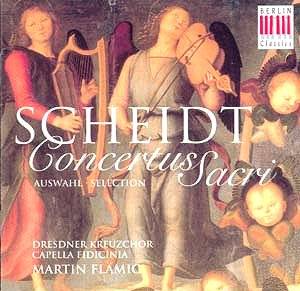SAMUEL SCHEIDT (1587-1654)
Concertus Sacri (selection)
Concertus V: Hodie completi sunt [10.29]
Concertus XII: Magnificat [16.56]
Concertus IX: Magnificat 8 toni [13.53]
Concertus II: Laudate Dominum in Sanctis [15.14]
 Dresdner Kreuzchor, Ulrich
Schicha Dresdner Kreuzchor, Ulrich
Schicha
Capella Fidicinia, Hans Gröh
Conductor, Martin Flämig
Rec: April and November 1983.
 BERLIN CLASSICS 0091262BC
[56.54] BERLIN CLASSICS 0091262BC
[56.54] |
 |
|
Samuel Scheidt, one of the most important German composers of the 17th century,
is best-known for his many organ works. Yet he also composed a sizeable number
of sacred vocal works, which are closely related to liturgical practices
in Halle, where Scheidt spent most of his life.
Scheidt's music is surprising, when compared to that of his contemporaries.
While firmly rooted in the German motet form, which was predominant at the
time, it also features a variety of elements from the then-new Italian style.
The standard vocal concerto form is respected, yet the influence of the Italian
madrigal give them tone colours and rhythms that are totally unexpected.
In the Concertus XII, for example, there is a sharp contrast between the
brief sections sung in plainchant, which act as a kind of recitative, and
the longer concerto sections, with soloists and choruses flying around
ecstatically over a rich instrumental accompaniment.
The instrumentation is also much more complex than many of his contemporaries
- Scheidt uses a wide variety of instruments, which give his music a unique
texture. Concertus V features a group of viola da gambas, providing an
interesting tone, together with flutes. Concertus XII is a simpler work,
relying on the choir for a large share of the music, with only an organ,
gamba and violone providing continuo. The starkness of the instrumental
accompaniment here is in sharp contrast with the richness of the vocal colours.
This music is unique - it has such an ornate sound that it is in sharp contrast
with Scheidt's contemporaries, particularly Schütz. The performances
are fine, although some of the soloists lack depth, and seem a bit out of
place. Nevertheless, this recording is very satisfying, and provides an
interesting overview of one of the most unique German composers of the 17th
century, one who was able to ally two very different styles into immensely
intricate sacred works.
A fine recording of some very interesting sacred music from 17th century
Germany. Scheidt combined traditional German forms with the then-new Italian
style, creating works of unusual richness.
Kirk McElhearn
CONTACT DETAILS
http://www.edelclassics.com
EDEL/Berlin Classics discs CANNOT yet be ordered directly from the
website. However it is probably worth browsing anyway:
You can try:-
EDEL affiliates in UK and USA:
edel UK ltd.
12, Oval Road
NW1 7DH London
phone: 0044 207 48 24 848
fax: 0044 207 48 24 846
edel America Records, Inc.
1790 Broadway, 7th Floor
New York, NY 10019
phone: 001 212 5419700
fax: 001 212 6648391

